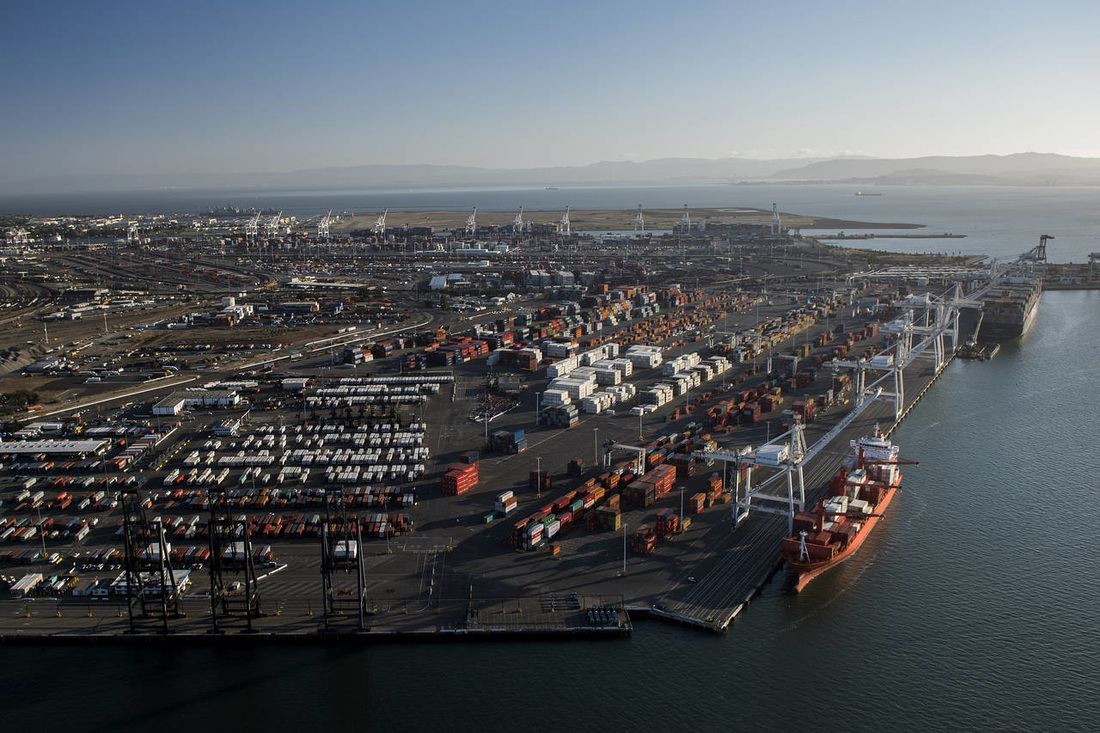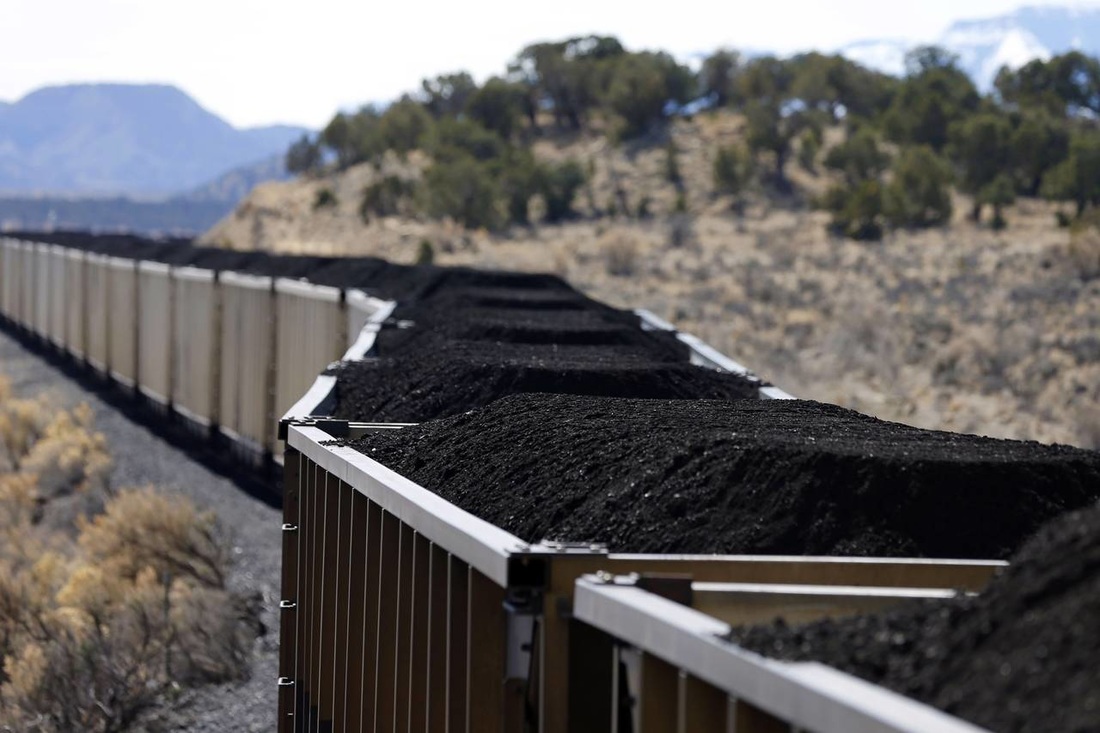|
Environmental groups take aim at a rail project to ship coal through the city  By ALEJANDRO LAZO Oct. 18, 2015 7:54 p.m. ET OAKLAND, Calif.—A proposal that could make this city a gateway for Utah coal to be shipped overseas has become a political flash point and put pressure on Gov. Jerry Brown, a former mayor known for his warnings on climate change, to come out against the project. The proposed deal would grant four coal-producing counties in Utah rail access to a major commodities shipping terminal under development on city land, adjacent to the Port of Oakland, in exchange for a $53 million investment. City officials hope the redevelopment plan, on an old Army base, would bring thousands of jobs to a city that still has pockets of poverty and violence even as the region’s tech sector booms and housing costs rise. California ports in Stockton, Richmond and Long Beach export coal, but because of climate change and pollution concerns, such terminals have become highly contested on the West Coast. Environmentalists, who have defeated similar proposals in Oregon and Washington, have filed suit against the city, the project and developers. They are now calling on Mr. Brown, a Democrat, to speak out forcefully against coal being shipped through his former city. “We are hopeful that he won’t let his hometown of Oakland become a thoroughfare for dirty coal,” said Jessica Dervin-Ackerman, conservation manager with the local chapter of the Sierra Club. Mr. Brown declined to comment on the Oakland terminal. While he has sounded an alarm on climate change—recently telling a Vatican symposium that 90% of the world’s coal must remain unused to evade the perils of global warming—as governor he has angered environmentalists by allowing the expansion of hydraulic fracturing in the state. The master developer of the project is Phillip Tagami, a local businessman with close ties to Mr. Brown, who is credited with sparking a revitalization of the city’s downtown when he served as mayor from 1999 to 2007. Mr. Brown is an investor with Mr. Tagami in an Oakland office building, according to an economic disclosure form filed by the governor. During Mr. Brown’s gubernatorial administration, Mr. Tagami served as chairman of the state’s Lottery Commission and as a member of its Medical Board; he left the administration in 2013. The terminal, which would sit at the end of an existing track network, would be managed by Terminal Logistics Solutions, a company that is looking to partner with the Utah counties to export commodities including coal. “It is important to realize that this is an opportunity for Oakland,” Jerry Bridges, the company’s chief executive, told City Council members last month. Mr. Tagami said he has spoken with Mr. Brown about the project, assuring him the terminal was designed to accept a wide variety of goods and has passed all necessary environmental reviews. The project, dubbed Oakland Global, is expected to bring in as much as $2.9 million in annual property taxes for the city, schools and other local governments, and has already created more than 2,300 jobs, he said. “This is a local issue, and I think he respects it as that,” Mr. Tagami said. Utah backers say the state’s coal burns more efficiently and has a lower sulfur content than coal from elsewhere, though experts say it doesn’t necessarily emit less carbon dioxide, the main greenhouse gas produced by industry. The state has sought new markets for its coal as energy companies and utilities in the U.S. have moved toward natural-gas plants and renewable forms of energy due to stricter federal pollution rules. While coal mining represents a fraction of Utah’s economy, it has long been a source of jobs for counties in the central and southeastern part of the state. Statewide production of coal last year was near a 30-year low amid lower demand from Nevada and California. The Oakland terminal would give the Utah counties four million to five million tons of annual shipping capacity and access to overseas markets including Asia, where coal is in greater demand than in the U.S. At an estimated 17.2 million short tons, Utah coal production was up 1.5% in 2014 from the year before, but nowhere near the 24.5 million tons averaged during the past decade. The state’s coal producing counties are seeking ways to sell their coal out of state and to overseas markets, but doing so requires new infrastructure, said Arnold Reitze, a professor at the College Of Law at the University of Utah.
“This is what I call ultraclean coal, and it has a place in the world markets,” said Jae Potter, a commissioner in Utah’s Carbon County. “It has a place in developing countries.” But the idea of coal being shipped through Oakland has roiled politics in the city of about 414,000. Among those concerned is Mayor Libby Schaaf, a former aide to Mr. Brown when he was mayor. “We will not have coal shipped through our city,” Ms. Schaaf wrote to Mr. Tagami in an email that was made public. Oakland’s City Council, which held a contentious hearing on the issue last month, is considering an ordinance to ban coal at the terminal. The Sierra Club argues coal dust has been linked to decreased lung capacity, childhood bronchitis, asthma, pneumonia, emphysema and heart disease. Mr. Bridges, of Terminal Logistics, told council members that any coal shipped through the city would be in covered trains, eliminating the risk of coal dust. Mr. Tagami said no restrictions should be imposed on which commodities the terminal can export and that doing so could harm the project’s success. Write to Alejandro Lazo at [email protected] http://www.wsj.com/articles/oakland-coal-terminal-becomes-a-political-flash-point-1445212486
0 Comments
Leave a Reply. |
Gene HazzardDon't Be Envious of Evil Men Archives
June 2024
Categories
All
|
- Home
- Sanjiv Handa
- Gene's Blog
- Rotunda RFP
- Gene Hazzard -Keeping eyes open
- Chronology of Tagami's scheme of Private-Public Partnership with City Projects
- Another Tagami scheme - Rotunda Building deal
- Oakland Army Base
- Billboards in Oakland
- Port of Oakland
- Oakland Raiders?
-
Who is running Oakland?
- Jerry Brown
- Don Perata
- Judge Robert B. Freedman
- Jacques Barzaghi
- Gawfco Enterprises
- Deception
- Doug Bloch
-
Phil Tagami
>
- SF Business Times November 20, 2005
- Rotunda wrestling
- A conversation with Oakland developer Phil Tagami
- Audit of $91 million Fox Theater project
- Tagami Conflict
- CCIG Response to Oakland Works
- Oakland developer Phil Tagami named to state medical board
- ‘Shotgun Phil’ hits another bullseye — with governor’s help
- CleanOakland Store
- CenterPoint Properties


 RSS Feed
RSS Feed
